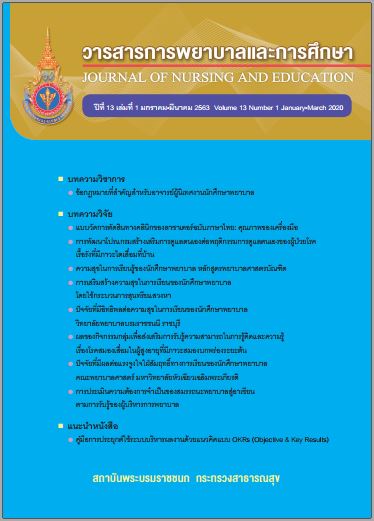ความสุขในการเรียนรู้ของนักศึกษาพยาบาล หลักสูตรพยาบาลศาสตรบัณฑิต
Happy Learning among Undergraduate Nursing Students
คำสำคัญ:
ความสุขในการเรียน, นักศึกษาพยาบาลหลักสูตรพยาบาลศาสตรบัณฑิตบทคัดย่อ
บทคัดย่อ
การวิจัยเชิงพรรณาแบบ ( Descriptive Correlational Research) มีวัตถุประสงค์เพื่อศึกษาปัจจัยที่มีความสัมพันธ์ต่อความสุขในการเรียนของนักศึกษาหลักสูตรพยาบาลศาสตรบัณฑิต ได้แก่ ลักษณะของนักศึกษา ลักษณะการจัดการเรียนการสอน ลักษณะอาจารย์ พ่อแม่หรือผู้ปกครอง ลักษณะสถานศึกษา และนักศึกษาร่วมสถาบัน กลุ่มตัวอย่างเป็นนักศึกษาพยาบาลทุกชั้นปีของมหาวิทยาลัยแห่งหนึ่งในกรุงเทพมหานคร จำนวน 798 คน เครื่องมือที่ใช้ในการเก็บรวบรวมข้อมูล ใช้แบบสอบถาม ประกอบด้วยแบบสอบถามข้อมูลส่วนบุคคล แบบสอบถามความสุขในการเรียนและสภาพแวดล้อมที่เกี่ยวข้องกับนักศึกษา โดยมีค่าความตรงเชิงเนื้อหาเท่ากับ 0.92 และ 0.99 และค่าสัมประสิทธิ์แอลฟ่าครอนบาคเท่ากับ 0.89 และ 0.97 ตามลำดับ วิเคราะห์ข้อมูลโดยหาค่าร้อยละค่าเฉลี่ย ส่วนเบี่ยงเบนมาตรฐานและวิเคราะห์ความสัมพันธ์โดยใช้สหสัมพันธ์ของเพียรสัน
ผลการวิจัยพบว่านักศึกษาพยาบาลมีความสุขในการเรียนในภาพรวมอยู่ในระดับมากโดย มีค่าเฉลี่ยเท่ากับ 3.89 (S.D. = 0.57) ประเมินปัจจัยที่มีผลต่อความสุขทุกด้านอยู่ในระดับมากโดย มีค่าเฉลี่ยเท่ากับ 4.14 (S.D. = 0.54) การวิเคราะห์หาความสัมพันธ์ของตัวแปร พบว่า ปัจจัยด้านลักษณะนักศึกษา ลักษณะการจัดการเรียนการสอน ลักษณะอาจารย์ พ่อแม่หรือผู้ปกครอง ลักษณะสถานศึกษา และลักษณะนักศึกษาร่วมสถาบัน มีความสัมพันธ์ผลทางบวกกับความสุขในการเรียนของนักศึกษาพยาบาล อย่างมีนัยสำคัญทางสถิติที่ระดับ .01 (r = .653, r = .628, r = .577, r = .473, r = .452, r = .442, ตามลำดับ) ผลการวิจัยนี้สามารถเป็นข้อมูลพื้นฐานสำคัญในการเสริมสร้างความสุขในการเรียนโดยการจัดสิ่งแวดล้อมให้เอื้อต่อการเรียนการสอน
เอกสารอ้างอิง
1. Khuneepong, A., Tuntiakakarat, S. The Relationship between Environments of Educational Institute and Learning Happiness of Public Health Undergraduate Students, Valaya Alongkorn Rajabhat University under The Royal Patronage. Journal of Nursing and Education. 2017; 10(1): 64- 76. (in Thai).
2. Bundasak, T., Chaowiang, K., and Jangasem, N. Happily learning among Nursing Student, Journal of MCU Peace Studies, 2017; 5(1): 357-369. (in Thai).
3. Onsri, P., Chaleoykitti, S. Nursing Learning Provision for Happiness: Role of Teacher and Learner. Journal of the Royal Thai Army Nurses. 2013; 14(1): 8-16. (in Thai).
4. Townsend, M. C. Essentials of psychiatric mental health nursing: concepts of care in evidence-base practices. (5th ed.) Philadelphia: F. A. Davis Company. (2011).
5. Wongprach, B. Factors Related to Stress and Coping Stress of Nursing Students in The Royal Thai Army Nursing College Journal of The Royal Thai Army Nurses. 2018; 19(2) 201-210. (in Thai).
6. Annapatiwet, S., Akrasthitanoon, C. AComparison study of Resillence Quatient (RQ) Before and After Mental Health & Psychiatric Nursing Practicum among Junior Nursing Students, St. Theresa International Colleague. Journal of Nursing and Education. 2011; 4(1): 38-51. (in Thai).
7. Kawsaaed, N., Arpanantikul, M., and Putawatana, P. Selected Variables Related to Nursing Students’ Happiness, Thai Journal of Nursing Council; 2013; 2891): 19-33. (in Thai).
8. Saito, A., Voraharn, W., and Senarak, W. Happiness of Undergraduate Nursing Students, Faculty of Nursing, Khon Kaen University. Journal of Nursing Science & Health, 2011; 34(2): 70-79. (in Thai)
9. Thongsom, P. The Development of Indicators of Happiness in Learning of students in Nursing Science Undergraduate Program under The Ministry of Public Health. Journal of Nursing and Education. 2011; 4(1): 88-111. (inThai).
10 Beamukda, P. The Innovative Design Education System Sustainability by The Principles of Buddhism : A Case Study Concept and Vision of Steve Jobs. Journal of MCU Peace Studies. 2015; 3(2), 133-145. (inThai).
11. Vinijkul S. Reansuwong S. Sukarate P. Relationship between Academic Environment, Learning happiness, and Academic achievement of nursing Students at Kuakarun Faculty of Nursing, Navamindradhiraj University. Kuakarun Journal of Nursing, 2014; 21:7-24. (in Thai).
12. Astin A. W. What matters in Colleague?. San Francisco: Jossey-Bass, 1993.
13. Wanna, G., Chaimomgkon, N., Bootanook, P. Factors Influencing Happiness among Nursing Students in Private University. Journals of Nursing, Siam University. [cited 2020/ 1/10]. Available from: file:///C:/Users/User/AppData/Local/Packages/Microsoft. MicrosoftEdge_8wekyb3d8bbwe/TempState/Downloads/140356-Article%20Text-372717-1-10-20180815%20(9).pdf
14. Gibbons, C., Dempstar, M., Moutry, M. Stress, coping and satisfaction in nursing students. Journal of Advanced Nursing, 2011; 67(3): 621–632.
15. Jungpanich, A., Srisailaun, O. Effects of Using Daily Care Plan Video Teaching on Clinical Self-Confidence and Satisfaction of Nursing Students, Kuakarun Faculty of Nursing ,Navamindradhiraj University. kuakarun Faculty of Nursing. 2015; 22 (1 ): 17 -34.
16. Goleman, D. Social intelligence: The new science of human relationships. London: Random House Group, 2006.
17. Allbrecht, K. Social intelligence: The New Science of Success. San Francisco: Jossey- Bass A. Wiily Imprint, 2006.
18. Sinsawad, P., Pittard, B. Factors Related to Quality of life of nursing student at Boromarajonani College of Nursing. Ratchaburi. Kuakarun Journal of Nursing, 2016; 23(1): 7-20. (in Thai)
19. Kaithawan, P., Kittipimpanoon, K. The Realationship among Sensed of University, Belonging, Happiness in Learning, Learning-Facilitating Environment, Academic Achieviement among Underguduate Nursing Science Students. Rama Nurs J. 2014; 20(3): 415-429. (in Thai)
20. Clark, E., Montague, S. The nature of stress and its implications for nursing practice. Nursing Practice & Health Care. Great Britain : Edward Arnold,1993.






